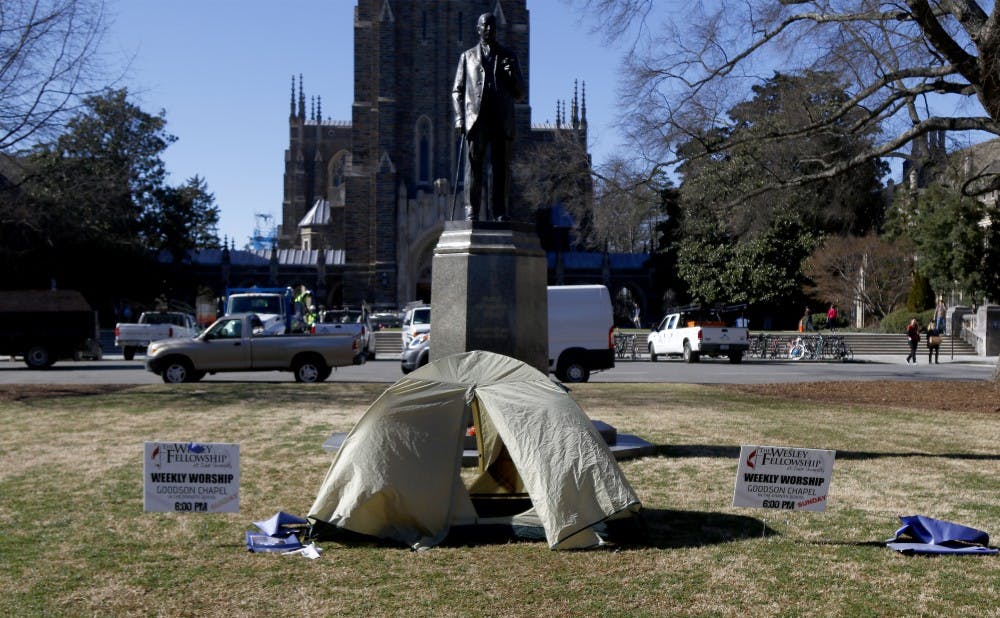The small tent in front of the James B. Duke statue and Duke Chapel was not just for a lost K-Ville tenter.
To raise awareness of livable wage issues, the Encounter: Social Justice organization set up Justice-Ville, or J-Ville, for the third year. Based within the Catholic Center, the group hosted a prayer, a documentary showing and held a discussion panel during a 12-day event that ended Monday.
“There have been multiple studies that show that it is just not possible for any human being, even if they’re completely alone, to live on [minimum wage] in the United States,” senior Audra Bass said. “There are several states that have tried to raise their minimum wage so that it’s more of a living standard, but this is not the case for everywhere, and so you end up with this awful poverty cycle.”
The J-Ville group screened a documentary last week called “30 Days”—in which filmmaker Morgan Spurlock, the creator of “Super Size Me,” and his fiancée spent 30 days attempting to live on minimum wage. Earlier in the 12-day event, students handed out hot chocolate with informational pamphlets in K-Ville.
They also hosted a panel discussion last week that included representatives from Joe Van Gogh, a living wage business and Durham CAN, an umbrella organization that focuses on tackling social justice work. Bass encouraged students to attend the panel and bring questions about livable wages.
“We have several representatives from Durham who have some personal or intentional connection to this problem,” Bass said. “I think we’re most excited about the panel because it’s not just Duke; it’s really bringing in the Durham community.”
In most parts of Durham, businesses have raised wages to round $12. Bass said studies have shown that businesses paying a living wage do not suffer from a lack of profit.
J-Ville was founded three years ago by a collection of representatives from various campus ministries, including the Catholic Center, Wesleyan Methodist Fellowship and the Presbyterians. In its first year, the event focused on raising awareness about homelessness. The physical tent in front of the Chapel was a part of an event in which students could camp out in the tent as a show of solidarity.
“The idea was to have the tenters from K-Ville uproot their tents and put them in front of the chapel,” said junior John McMichael, a founding member. “In doing that, they’d raise awareness about homelessness.”
Although living wage does not easily connect to actually camping out, Bass said the goal was to fill the tent with food for the food bank. At the end of the event this year, the tent had collected 15 bags worth of food, and people attending the discussion panel were encouraged to bring canned good items.
Junior John Turanchik, another founding member of J-Ville and candidate for DSG executive vice president, said some of the priorities of J-Ville have evolved since it started. J-Ville was founded with the intent to raise awareness of social justice issues not particularly prominent in the media, he said, but living wage is a large part of the current national dialogue. There is, however, still a way for students to make an impact.
“J-Ville was conceptualized as a way to raise awareness about the issue,” he said. “Not only for other people to see us, but for individuals to understand the plight more.”
Although Bass is not expecting any rapid change to the living wage issue, she and McMichael said they would like to see more and more people become involved in J-Ville in the coming years.
Turanchik also noted the “shelf-life” of the impact on students and said he hopes that J-Ville’s unique focus on learning would propel it forward.
“In a perfect world, we would do it and everyone would realize these are important issues that might not get played up in the media but have equal validity and are real problems in the United States,” Turanchik said. “We care about it and bring those narratives home to our families, finding value in working towards solving that problem.”
Get The Chronicle straight to your inbox
Signup for our weekly newsletter. Cancel at any time.

